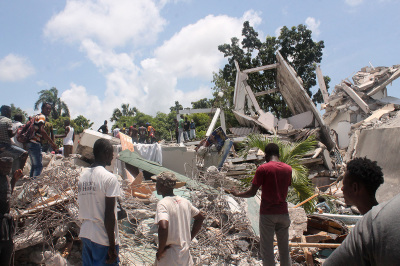How to help children in Haiti: 3 lessons from 2010
As the death toll continues to rise from the 7.2 magnitude earthquake that struck Haiti on Saturday morning, we remember lessons learned from the quake of 2010. Images of leveled buildings and a death rate estimated at 200,000 moved American Christians to respond with astounding generosity. Yet, their good intentions were often misguided, including the building, volunteering in and funding of orphanages.
As often happens in a natural disaster, families were separated with no way to contact one another. When the quake hit, many were away from their homes working, traveling, or running errands, and children were in daycare or school. Families were scattered, children left alone, in many cases parents never returned home.

While aid organizations began to work with the government to set up ways to help reunify children with parents or other family members such as posting photos of missing children in tent cities, already vulnerable children became more susceptible to harm in the midst of the disaster. The chaos made way for well-meaning Americans to subvert processes and safeguards as they placed children from the streets in orphanages. One church in particular made headlines when its missionaries tried to take 33 Haitian babies to an orphanage they were establishing in the Dominican Republic.
Christians were hopeful their financial support and visits to orphanages would mean children were protected. However, a lack of experience in disaster response and little understanding of the context contributed to children who could have been cared for by their families being inappropriately placed in these facilities.
Research reveals that living in an orphanage, especially for a long time or at a young age, has negative impacts on a child’s physical, intellectual and social-emotional development. For example, one study found that for every three months in an institution, a child loses one month of development. Additionally, living in an orphanage results in increased risks such as trafficking and later in life many end up unemployed, homeless, or sexually exploited. A family is vital for the physical, mental, and social development of a child. Orphanages should only be used as a last resort and a temporary placement for a child while a family care option is being found.
History has shown that in response to the earthquake last Saturday, individuals and organizations will undoubtedly rush to build new orphanages or redouble support for existing ones to help provide a “home” for these vulnerable children. However, in the decade since the last major earthquake much has been learned that we can apply today:
1. Support organizations with experience in disaster relief.
Humanitarian disaster relief requires a significant level of preparedness and sophistication. Organizations who specialize in disaster relief understand the importance of protecting children and ensuring everything is done to keep them with their families. We recommend supporting well-established agencies like World Vision or Catholic Relief Services to respond to the immediate challenges facing the people of Haiti.
2. Do not start new orphanages.
Haiti is not in need of orphanages and, in fact, it is illegal to start an orphanage in Haiti. The addition of new orphanages will lead to the separation of more children from families. It may be appropriate for a child to be taken into a temporary emergency shelter, but the child should remain with a safe adult and as near to their community as possible. All efforts should be taken to quickly find and reunite the child with their parents or relatives
3. Support families to care for children.
Families are vital for a child’s sense of security, identity, and belonging. Therefore, it is important that families are preserved, cared for, and supported in these challenging times. Faith to Action has worked with several family strengthening organizations over the years who are well positioned to support families in this crisis. Consider supporting the work of Bethany Christian Services, Child Hope International, Heartline Ministries, or Little Footprints Big Steps.
With strategic contributions to the relief of the Haiti earthquake, American Christians have the opportunity to provide life saving relief that preserves families, rather than separating them.
Please respond generously to the suffering and devastation of the earthquake in Haiti, but do it with wisdom so that children can live in the safety and love only a family can provide.
Elli Oswald is the executive director of the Faith to Action Initiative, a coalition of organizations focused on promoting best practices in care for orphans and vulnerable children.



























